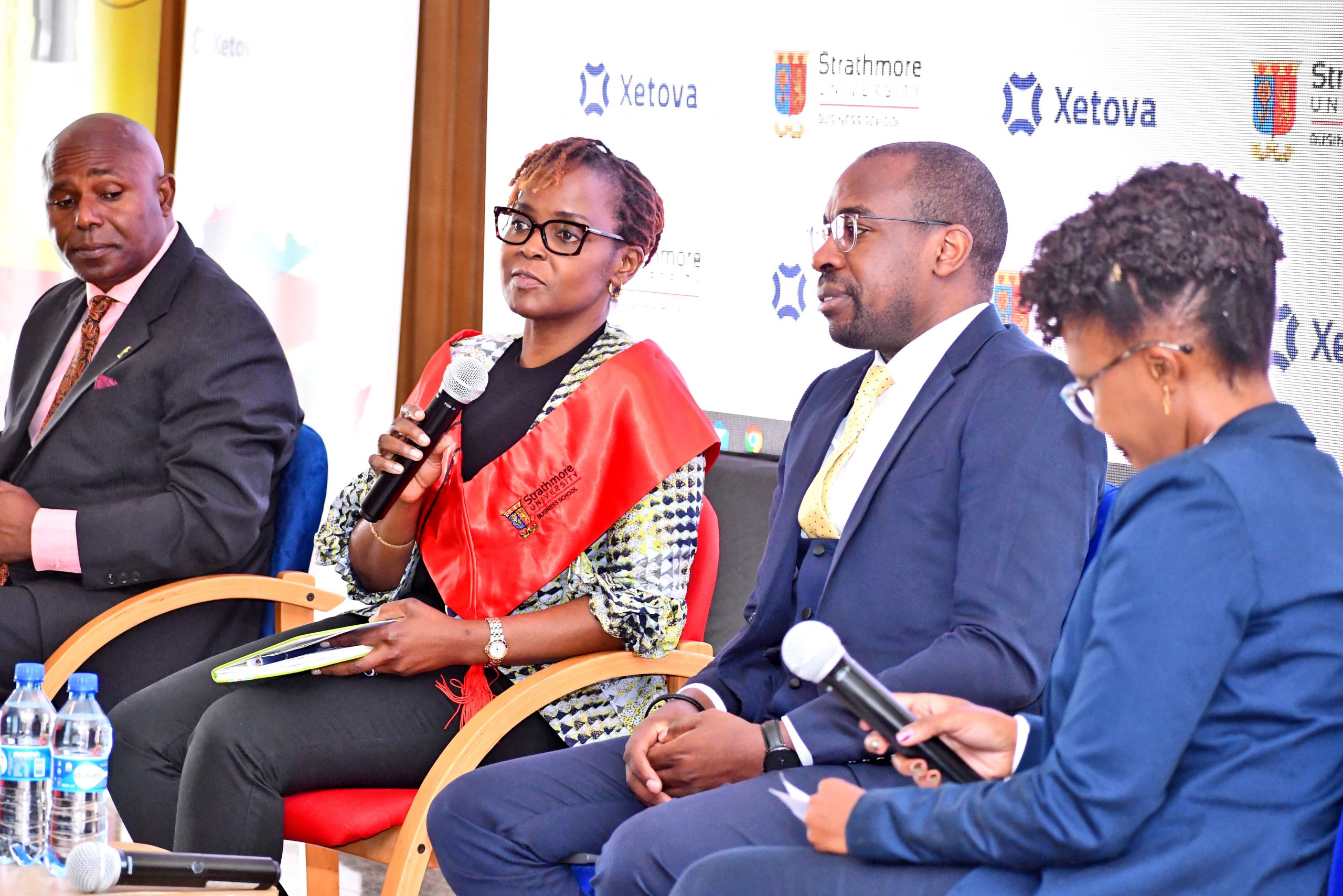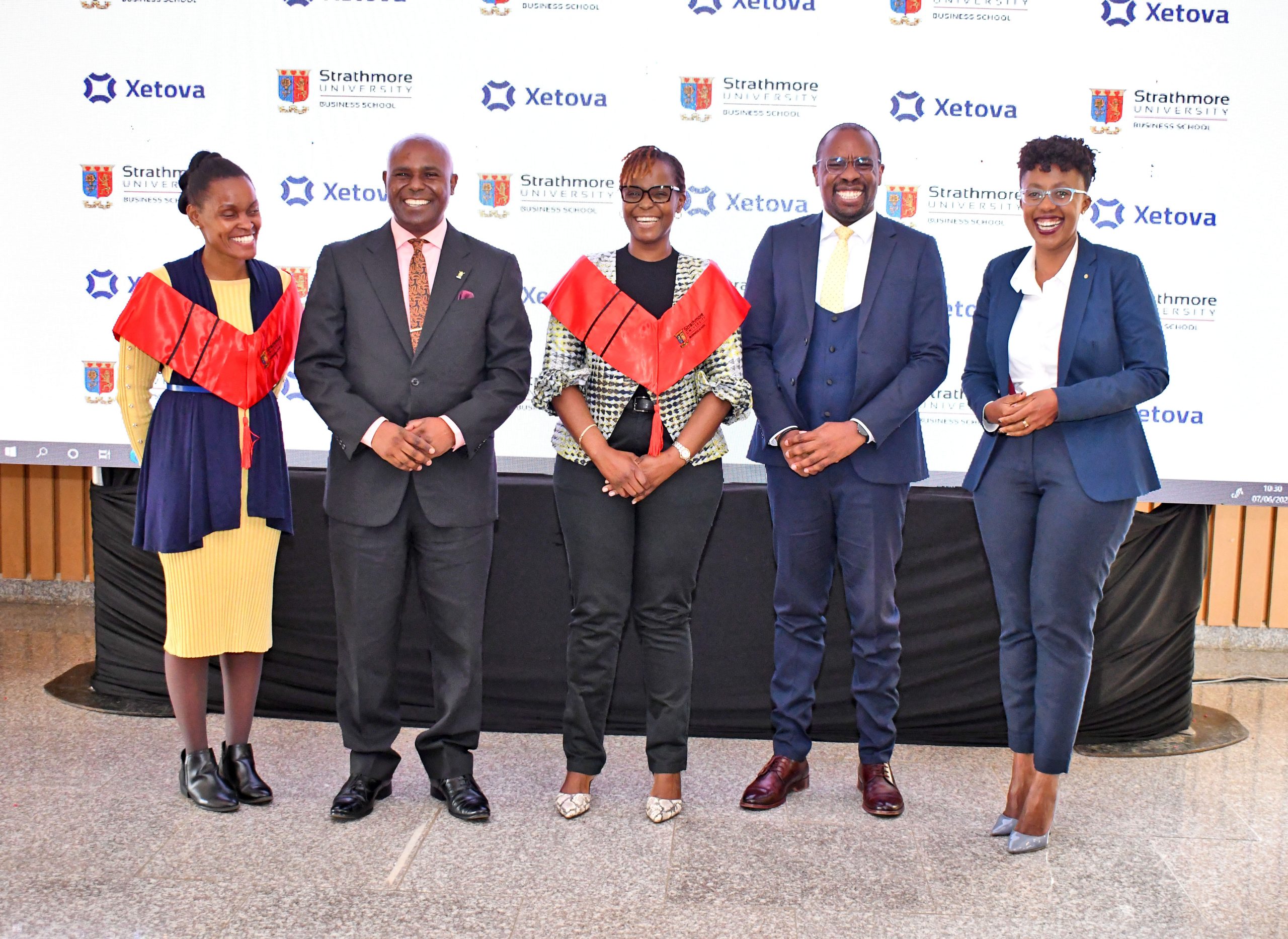Big data plays a big role in our day to day lives. Artificial Intelligence and machine learning are tools used by major corporations to zone in on consumer demands based on purchasing decisions and consumer preferences. Today, industries such as pharmaceuticals, automobile manufacturing, and financial services rely on technology to derive consumer insights for predictive purposes to optimise operations.
Currently, delays are the biggest challenge in supply chain management – systems that manage data and give accurate, real-time feedback fill these gaps and provide a sort of reprieve for major operations amid a global supply chain crisis.
On Tuesday, 7th June, 2022, Strathmore University Business School (SBS), in partnership with Xetova, graduated 75 supply chain practitioners undertaking the Supply Chain Transformation Leadership Programme, a Customised Programme designed for supply chain and procurement managers and directors. Speaking during the graduation ceremony, Lena Gachoki, the Course Lead for this Programme, lauded the participants for their commitment to the six months training and coaching Programme that demanded participants to challenge themselves to explore new possibilities into Africa’s supply chains. Professor Jonathan Annan, Associate Professor Operations, Logistics and Supply Chain Management at SBS, identified the key thematic areas causing a tectonic shift globally since the Covid-19 pandemic. “It is now clear that the baseline model is digitalization driving resilience, and resilience leading to sustainability”, stated Professor Annan.
Data driven systems are the backbone of Xetova’s services and their variety of integrated tools designed to optimise operations only begins with supply chain management. Bramuel Mwalo, Xetova CEO and founder has a “renewed commitment to making Africa work”. He chooses to have intentional leadership that not only solves problems, but empowers employees to solve problems” – this was the inspiration to partner with SBS in founding the Supply Chain Transformation Leadership Programme. This programme is supported by the Kenya Institute of Supply Chain Management (KISCM), with which both parties recently signed an MOU to expand and enrich management training Programmes. SBS is their knowledge partner. A study by the Centre for Applied Research and Innovation in Supply Chain – Africa (CARISCA) showed that Africa lacks research into supply chains. Thus, embracing technology can create a vast database of reference for procurement managers and unlock the many possibilities for Africa’s supply chain.
Disruption Absorption Capability and Recovery Capability
According to Professor Annan, operational resilience boils down to “disruption absorption capability and recovery capability”. Broken down, this outlines the capacity to withstand disruption and recovery. Embracing technology, both for organisations and individuals, is the key to unlocking this steadiness.
Technology begins at digitalization. Artificial Intelligence is but one of the components to optimising operations in supply chain, for technology to align with your purpose and process, components such as virtual integration with suppliers is a game changer. Digitalization and data mining can identify underlying issues and gain qualified solutions to better serve people and streamline the supply journey. Dr. Sylvia Vito, Head Africa Acceleration, Government Affairs and Market Access at AstraZeneca explained how the pharmaceutical company used machine learning to gain a global edge in producing the Covid-19 vaccine, “AstraZeneca was able to produce a vaccine faster than other pharmaceutical companies through machine learning tools that collected data on the SARS virus”.
Transformational leaders are those with a 360 view of what ails Africa’s supply chains. Beyond digitalization, Africa is poised to take the lead in global supply chains – Oil and gas prices have skyrocketed since the Ukraine invasion putting a global strain on supply. Africa’s reserves can supplement this with the right policies and leadership in place that will implement an inclusive refinery solution that will reduce overall costs and benefit the consumer and the environment. Furthermore, as electric vehicles gain traction globally, the demand for lithium for battery production is on the rise – many Chinese automakers are now buying mines in Africa to meet the growing demands for their lithium-ion batteries. These disruptions can change the economic narrative of Africa, simply known as a producer of natural resources without the refinery capacity.
Africa’s recovery capability is hinged on organisations and individuals who are willing to be part of solutions to creating globally inclusive supply chains – “this is now a core responsibility for leaders and must be embedded into every employee and entrepreneur to understand the consumer journey and how to use technology to solve problems”, Dr. Sylvia Vito said.
About our Customised Solutions
At Strathmore University Business School, we offer a range of Customised Solutions that focus on providing clients with tailored and bespoke programmes and consulting solutions to ensure that we address their unique and specific needs.
Our Programmes range from developing areas of leadership and management skills to functional skills in operations management, finance and change management. We provide bespoke services that enable us to directly deal with client issues. This is particularly relevant where a generic solution does not fit the client’s needs. Learn about our Customised Solutions here
Article by Katherine Keango
Would you like to share an article? Write to us at sbscommunication@strathmore.edu
Share This Story, Choose Your Platform!
Your journey to business excellence starts here. Subscribe today and be at the forefront of innovation and leadership.










